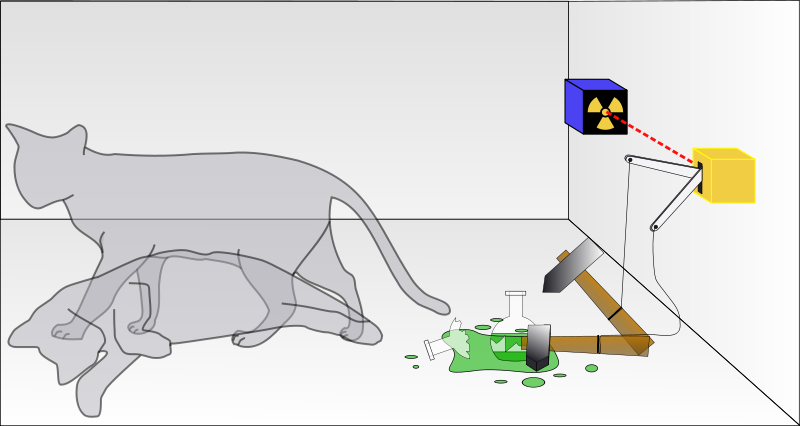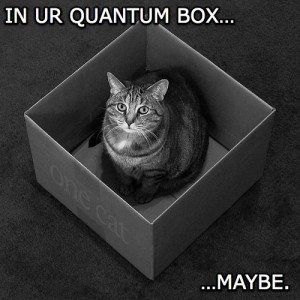“Consciousness is a singular of which there is no plural” –Schrödinger
From the book Creative Evolution
Can we do science of the primacy of consciousness? That is, can science be based on the idea that consciousness is the ground of all being and that all things of experience are chosen from quantum possibilities of consciousness? Where is the necessary objectivity? Now the quintessential proof: I’ll show you why the choosing consciousness of quantum physics has to be objective cosmic consciousness.
You may have heard of the famous paradox of Schrödinger’s cat. In this thought experiment,”a cat is left in an opaque cage with a door in the company of a single radioactive atom (with a half-life of one hour, which means that the probabilility is fifty-fifty that the atom will decay within the hour).  The scheme is diabolical. If the atom decays, then a Geiger counter detects the radiation from the decay. The ticking of the counter triggers a hammer to break a poison bottle, releasing cyanide that kills the cat. If the atom does not decay, none of the sequential things happens and the cat lives. Because the decay is probabilistic, a quantum process, it follows that at the end of the hour the cat is a wave of possibility, having two equally weighted facets, dead and alive.
The scheme is diabolical. If the atom decays, then a Geiger counter detects the radiation from the decay. The ticking of the counter triggers a hammer to break a poison bottle, releasing cyanide that kills the cat. If the atom does not decay, none of the sequential things happens and the cat lives. Because the decay is probabilistic, a quantum process, it follows that at the end of the hour the cat is a wave of possibility, having two equally weighted facets, dead and alive.
The cat is literally half-dead and half-alive?
This half and half state is an example of quantum weirdness, but it doesn’t constitute the paradox (we’ll get to that in a second). This state follows strictly from quantum mathematics. Because every consequence of quantum mathematics has been experimentally verified with uncanny accuracy, we must assume that this explanation accurately describes the cat’s situation when we are not observing it.
Of course when we observe it, we find the cat either alive or dead, not half-alive and half-dead. This is a paradox from the point of view of scientific materialism, because all objects are quantum possibilities; an observer’s brain is no exception. So why should an observer’s looking be tantamount to a choice between the cat’s life and death?
However if you have grasped the discussion above, you will see that if we adopt the metaphysical position that consciousness is the ground of all being, then indeed conscious looking is tantamount to choice and produces collapse.
The paradoxes continue…
Suppose Wigner has a friend in his lab; they visit while the cat waits in its cage as a possibility wave suspended between life and death. After the hour, out of politeness Wigner opens the cage. Because both are looking at once, whose looking is going to collapse the state of the cat? In other words, who gets to choose?
The paradox becomes acute if we posit that Wigner is a cat fancier: He would choose the cat to be alive. But his friend despises cats. No doubt his choice would be thumbs down: let the cat die! So again, whose choice counts? Does the cat live or die?
One solution is to posit that only Wigner is conscious, that his friend is a figment of Wigners imagination. This philosophy is called solipsism, and surely we all feel that way at times. But such a philosophy would not be scientifically useful, although, ironically, materialist metaphysics cannot refute it either.
 When you think about it, solipsism is not really a solution to the paradox; it just shifts the questions from “who gets to choose?” to “who gets to be the solipsistic head honcho?” The real solution, when it emerged, created a stir. Three physicists, Ludwig Bass (1971) in Australia, myself (Goswami 1989,1993) at the university of Oregon, and Casey Blood (1993,2001 a Rutgers University, all working independently, discovered the same resolution. The choosing consciousness is cosmic and unitive, transcending individuality.
When you think about it, solipsism is not really a solution to the paradox; it just shifts the questions from “who gets to choose?” to “who gets to be the solipsistic head honcho?” The real solution, when it emerged, created a stir. Three physicists, Ludwig Bass (1971) in Australia, myself (Goswami 1989,1993) at the university of Oregon, and Casey Blood (1993,2001 a Rutgers University, all working independently, discovered the same resolution. The choosing consciousness is cosmic and unitive, transcending individuality.
In other words, we don’t choose the cat’s fate from our ordinary individual consciousness, what psychologists call ego. We choose from a non-ordinary state of consciousness in which our ordinary individuality gives way to cosmic oneness- an objective consciousness beyond our and the cats individual conscious identity.
